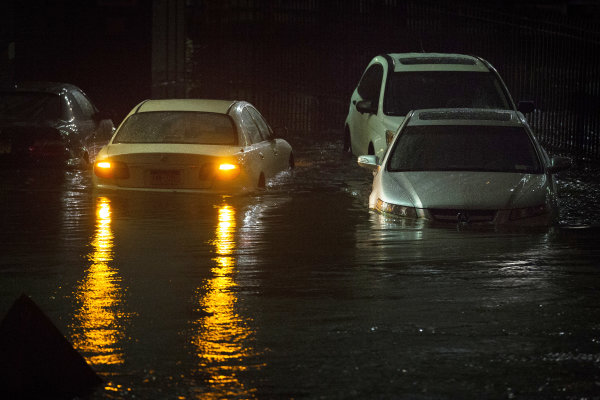
NEW YORK, N.Y. - Superstorm Sandy slammed into the New Jersey coastline
and hurled a record-breaking four-metre surge of seawater at New York
City on Monday, roaring ashore and putting the presidential campaign on
hold a week before election day At least 13 deaths were blamed on the
storm.
Sandy knocked out power to at
least 5.7 million people, and New York's main utility said large
sections of Manhattan had been plunged into darkness by the storm, with
250,000 customers without power as water pressed into the island from
three sides, flooding rail yards, subway tracks, tunnels and roads.
Just before its centre reached
land, the storm was stripped of hurricane status, but the distinction
was purely technical, based on its shape and internal temperature. It
still packed hurricane-force wind, and forecasters were careful to say
it remained every bit as dangerous to the 50 million people in its path.
By late night, the centre of the storm was over southern New Jersey.
The National Hurricane Center
announced at 8 p.m. that Sandy had come ashore near Atlantic City. It
smacked the boarded-up big cities of the Northeast corridor, from
Washington and Baltimore to Philadelphia, New York and Boston, with
stinging rain and gusts of more than 85 135 kilometres per hour. The sea
surged a record of nearly four metres at the foot of Manhattan,
flooding the financial district and subway tunnels.
The 13 deaths were reported in
New Jersey, New York, West Virginia, Pennsylvania and Connecticut. Some
of the victims were killed by falling trees. Police in Toronto said a
woman was killed by a falling sign as high winds closed in on Canada's
largest city.
As it made its way toward land,
it converged with a cold-weather system that turned into a fearsome
superstorm, a monstrous hybrid consisting not only of rain and high wind
but of snow. Forecasters warned of six-metre waves bashing into the
Chicago lakefront and up to 90 centimetres of snow in West Virginia.
Storm damage was projected at $10
billion to $20 billion, meaning it could prove to be one of the
costliest natural disasters in U.S. history.
President Barack Obama and Mitt Romney suspended their campaigning with just over a week to go before election day.At the White House, Obama made a direct appeal to those in harm's way: "Please listen to what your state and local officials are saying. When they tell you to evacuate, you need to evacuate. Don't delay, don't pause, don't question the instructions that are being given, because this is a powerful storm."
The storm washed away a section
of the Atlantic City Boardwalk in New Jersey. Water was splashing over
the seawalls at the southern tip of Manhattan.
New York Mayor Michael Bloomberg
said late Monday that the worst of the rain had passed for the city, and
that the high tide that sent water sloshing into Manhattan from three
sides was receding.
Still, authorities also feared
the surge of seawater would damage the underground electrical and
communications lines in lower Manhattan that are vital to the nation's
financial centre.
Water began pooling in rail yards
and on highways near the Hudson River waterfront on Manhattan's far
west side. On coastal Long Island, floodwaters swamped cars, downed
trees and put neighbourhoods under water as beachfronts and fishing
villages bore the brunt of the storm. A police car was lost rescuing 14
people from the popular resort Fire Island.








0 comments:
Post a Comment